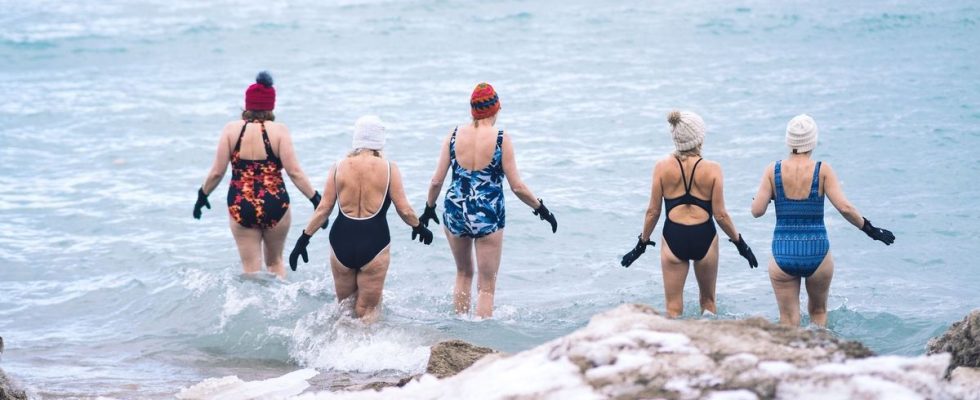Published on
Updated
Reading 3 min.
in collaboration with
Dr Gérald Kierzek (Medical Director)
Medical validation:
December 29, 2023
Are you one of those who want to start the year by taking the plunge? But isn’t this tradition a little dangerous for your health? Dr Gérald Kierzek, medical director of Doctissimo, gives us his advice for having a successful first bath of the year without taking any risks.
Every year, the television news on January 1st begin with the same images: courageous people of all ages, low-cut swimsuits and swimming caps screwed on their heads despite the cold, throwing themselves into the sea water with joy (and little cries). of surprise). Is this really reasonable?
A tradition that is growing
Whether in the North, on the Atlantic coasts or in the Mediterranean Sea, bathing on January 1st has become a French tradition which attracts more and more followers. Appointments given on social networks also inflate the figures. According to those who practice it, beyond the challenge, this contact with cold water would allow you to start the year with a moment of joy and relaxation, to give yourself a real boost, and would even help to eliminate excess meals. celebrations. But in fact, being confronted with icy water can also involve its share of risks, especially if you are not prepared. Gérald Kierzek, emergency physician and medical director of Doctissimo, has some tips to share to avoid cold showers after ice water.
8 tips from an emergency doctor before you immerse yourself
Despite the images full of spontaneity, jumping into cold water cannot be improvised. It is better to prepare for your outing, especially if you have fragile health.
Consult your doctor
Before diving into cold baths, especially if you have pre-existing health conditions, consult your doctor to make sure it is safe for you.
Take the time to acclimatize
If you are not used to cold baths, start gradually. Do not immediately immerse in ice-cold water. Start with shorter exposures and gradually increase the duration as your body acclimates.
Monitor your body temperature
Be aware of your own body. If you begin to experience excessive chills, numbness, or unusual fatigue, get out of the water immediately and warm up. The direct risk is hypothermia. For Dr Guillaume Barucq, doctor in Biarritz, quoted by RTL, the rule would be not to exceed 1 minute per degree. If the water is at 10 degrees, it is better not to stay there for more than 10 minutes.
Wear warm clothes after bathing
After the cold bath, wrap yourself in warm clothing to prevent excessive heat loss. This will help your body return to a normal temperature.
Avoid cold baths in case of illness
If you are sick, avoid cold baths, as this can increase stress on your body. If you have health problems such as heart conditions, circulatory problems, or breathing problems, consult your doctor before taking cold baths.
Don’t dive alone
If possible, do not take cold baths alone. Having someone with you can be crucial if you need help.
Respect your body’s limits
Everyone has a different tolerance to cold. Don’t push your body beyond its limits and be aware of the signals your body is sending you.
Don’t forget to hydrate
Finally, make sure you stay hydrated, even if you don’t feel thirsty during the cold bath.
No ice baths when you’re drunk!
The last important tip is based on your blood alcohol level this time. With a simple rule: you don’t bathe on January 1st when you still feel the effects of alcohol. “It is a state which causes fewer reflexes, less thermoregulation and above all less perception of risks. Going to sea when you are still drunk means taking the risk of drowning.” reminds our expert. In this case, it is better to drink a large glass of water, rather than jumping into it.
